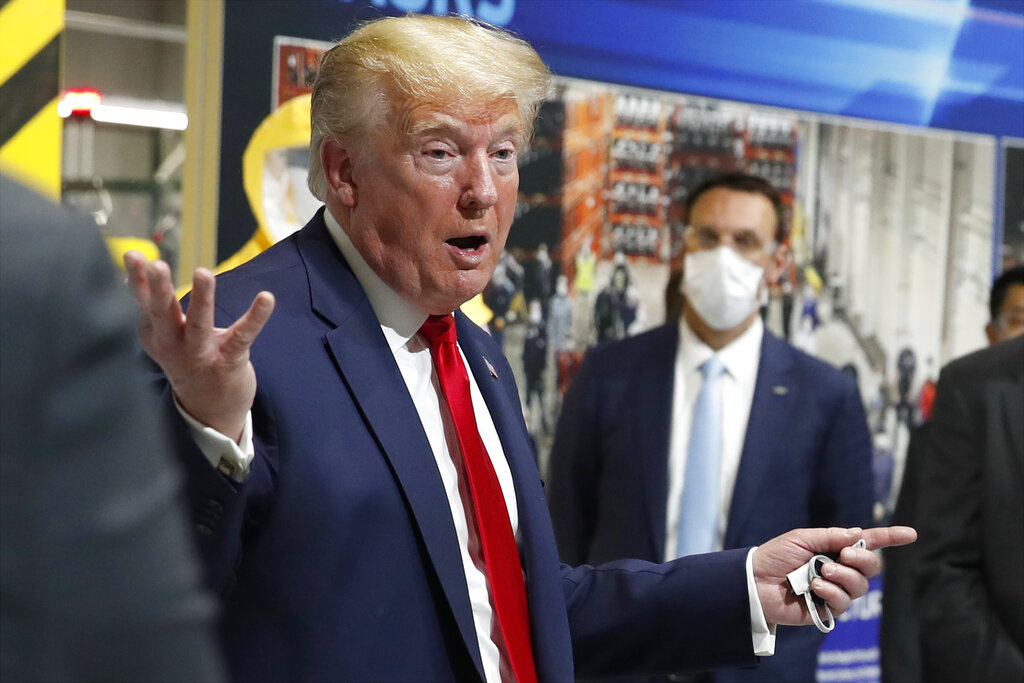As the death toll from the coronavirus rose above 100,000 in the United States, there were also record numbers getting sick in India and worrying signs of a resurgence in South Korea.
The once-unthinkable milestone in the US means that more Americans have died from the virus than were killed in the Vietnam and Korean wars combined.
'It's a striking reminder of how dangerous this virus can be,' said Josh Michaud, associate director of global health policy with the Kaiser Family Foundation in Washington.
India, home to more than 1.3 billion people, reported more than 6,500 new infections on Thursday as cases continued to rapidly rise. The surge comes as the nation's two-month-old lockdown is set to end on Sunday.
South Korea reported 79 new cases, its biggest daily jump in more than 50 days. It represents a big setback for a nation that has been held up as a model for containment.
South Korean health officials warned the resurgence is getting harder to track and social distancing and other steps need to be taken. Most new cases were from the Seoul metropolitan area, where about half of the nation's 51 million people live.
Some countries are seeing improvements. New cases in Spain and Italy have fallen steadily for two months. China reported just two new cases on Thursday, both from abroad. New Zealand has reported no new cases for six days and has just eight active cases remaining.
But the situation in many countries underscores the difficulty in reopening economies.
In the US, Las Vegas casinos and Walt Disney World have made plans to reopen, and crowds of unmasked Americans are expected to swarm beaches over the summer months. Public health officials predict a resurgence by fall.
Dr. Anthony Fauci, the nation's top infectious disease expert, issued a stern warning after watching video of Memorial Day crowds gathered at a pool party in Missouri.
'We have a situation in which you see that type of crowding with no mask and people interacting. That's not prudent, and that's inviting a situation that could get out of control,' he said during an interview on CNN.
Worldwide, the virus has infected more than 5.6 million people and killed over 350,000, with the US having the most confirmed cases and deaths, according to a tally by Johns Hopkins University. Europe has recorded about 170,000 deaths.
The true death toll from the virus is widely believed to be significantly higher, with experts saying many victims died without ever being tested.
Early on, President Donald Trump downplayed the severity of the virus, likening it to the flu, and predicted the US wouldn't reach 100,000 deaths.
'I think we'll be substantially under that number,' Trump said on April 10. Ten days later, he said, 'We're going toward 50 or 60,000 people.' Ten days after that: 'We're probably heading to 60,000, 70,000.'
Critics have said deaths spiked because Trump was slow to respond, but he has contended on Twitter that it could have been 20 times higher without his actions. He has urged states to reopen their economies after months of stay-at-home restrictions.
In hard-hit Brazil, the virus has been spreading into indigenous lands and this week two virus deaths were registered in the Xingu area, one of the biggest reserves in the world.
Those who died were from the Kayapo indigenous group. The community's leader, Megaron, said he wants President Jair Bolsonaro and other officials to stop loggers, miners and fishermen from illegally entering the territory, incursions he believes have sped up the spread of the virus.
But Bolsonaro is a strong critic of environmentalist groups and nonprofit organisations that work with indigenous people. He also contends there has been an overreaction to the virus and argues against lockdowns ordered by local officials, saying the economic disruptions will kill more than the virus.
Comparing countries is tricky, given varying levels of testing and that some deaths can be missed. According to figures tracked by Johns Hopkins, the death rate per 100,000 people is lower in the US than in Italy, France and Spain but higher than in Germany, China, South Korea, Singapore, Japan, New Zealand and Australia.
'The experience of other countries shows that death at that scale was preventable,' said Michaud. 'To some extent, the United States suffers from having a slow start and inconsistent approach. We might have seen a different trajectory if different policies were put into place earlier and more forcefully.'
Countries with low death rates suppressed the virus 'through lots of testing, contact tracing and policies to support isolation and quarantine of people at risk,' Michaud said.
Dr. Wafaa El-Sadr, director of ICAP, a global health center at Columbia University, called the U.S. death rate shocking.
'It reflects the fact that we have neglected basic fundamentals for health,' El-Sadr said. 'So, now we are in this shameful situation. It is the most vulnerable people in our midst — the elderly, the poor, members of racial/ethnic minority groups — who are the ones disproportionately getting sick and dying.' Associated Press











